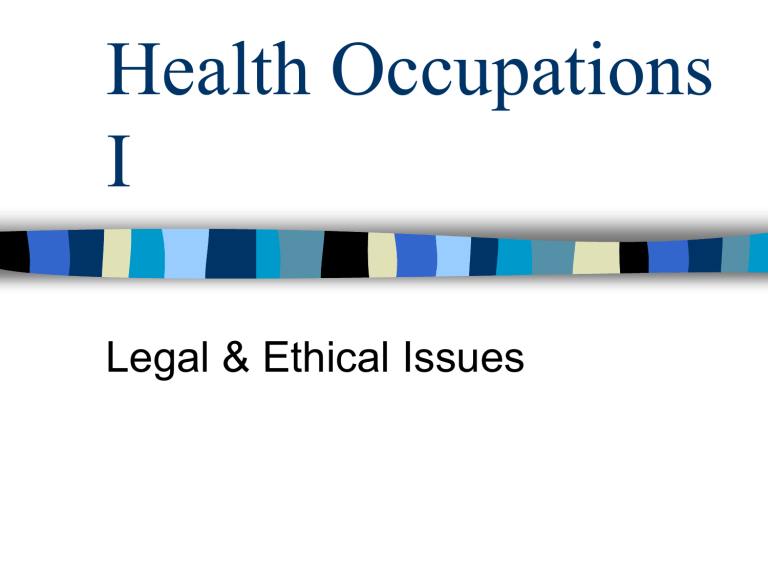HOC 1 - 4 Legal Ethical Issues

I
Health Occupations
Legal & Ethical Issues
Legal Responsibilities
Laws & legal responsibilities in every aspect of life
Goal – protect you & society (traffic laws)
Health care workers have certain responsibilities as well
– Important to be aware of & follow
– Protects you, the employer, & the patient
Legal Responsibilities
Based on law
Civil law or criminal law
– Civil law - dealing with legal relationships between PEOPLE & protection of a person’s
RIGHTS
– Criminal law – dealing with WRONGS against a
PERSON, PROPERTY, or SOCIETY
Health care mostly affected by CIVIL law
– Contracts
– Torts – wrongful act that does not involve a contract
Legal Responsibilities
Criminal laws can apply
– Practicing without a license
– Misuse of narcotics
– Theft
– Murder
Health care professionals are required to know & follow state laws regulating licensure or registration & set standards for their profession
TORTS
Occurs when a person is harmed or injured because a HCP doesn’t meet the expected standards of care
– Civil wrongs NOT crimes
– Can lead to legal action (lawsuits)
– Offenses may be complex & subject to interpretation
– Malpractice, negligence, assault & battery, invasion of privacy, false imprisonment, abuse, defamation
Malpractice
“bad practice”, commonly called professional negligence
Failure of a professional to use the degree of skill & learning commonly expected in a particular profession
Results in injury, loss, or damage to person
Examples –
– Puncture wound & dr. doesn’t order tetanus shot
– Nurse performing minor surgery without training
Negligence
Failure to give care that is normally expected of a person in a particular position with resulting injury to another person
Examples
– Falls due to side rails down
– Using or not reporting defective equipment
– Infections caused by non-sterile technique, equipment, or supplies
– Burns caused by improper heat or radiation
Assault & Battery
Closely related & often used together
Assault – includes a threat or attempt to injure
Battery – unlawful touching of another person without consent
Patients must give CONSENT & have the right to REFUSE
Some procedures require written consent
– Surgery
– Diagnostic tests
– Treatment of minors
– Side rail releases
Assault & Battery (cont)
Verbal consent is permitted at times
– Must be INFORMED CONSENT- permission given
• Voluntarily
• Person of sound mind
• After procedures & all risks involved have been explained in terms person can understand
Can withdraw consent at any time
Explain all procedures, DO NOT PERFORM if pt does not give consent
Examples
– Performing procedure after pt has refused tx
– Improper handling & rough treatment
Invasion of Privacy
Unnecessary exposure of a person OR revealing personal info without consent
Examples
– Improper draping or covering leaving pt exposed to view
– Sending info to an insurance company without written permission
– Informing news media about condition without permission
False imprisonment
Restraining an individual or restricting another person’s freedom
Examples
– Keeping pt hospitalized against his will
– Application of physical restraints without proper authorization or with no justification
Abuse
Any care that results in physical harm, pain, or mental anguish
– Physical – hitting, forcing persons against their will, depriving food/water, restraints, not providing personal care
– Verbal – shouting, swearing, harsh words, racism, abusive statements
– Psychological – threatening harm, denying rights, belittling, intimidating, ridiculing, threatening to reveal information
– Sexual – unwanted sexual touching or act, sexual gestures, suggesting sexual behavior
Abuse (cont)
Pts may experience abuse before entering your facility
– Domestic abuse –threatening, manipulative, aggressive, or violent behavior to maintain power & control
– Child abuse – directed toward a child
– Elder abuse – directed toward an older person
Abuse (cont)
Be alert to signs & symptoms indicating abuse
– Unexplained bruises, fractures, burns, injuries
– Signs of neglect – poor personal hygiene
– Irrational fears or change in personality
– Aggressive or withdrawn behavior
– Patient statements
Abuse (cont)
Presence of signs & symptoms indicate need for more investigation
Health care workers are REQUIRED to report any signs of abuse –
MANDATED REPORTERS
Laws in all states protect reporting of any type of abuse to authorities
Defamation
False statements that cause a person to be ridiculed or cause damage to his/her reputation
Incorrect info given out in error
– Libel – written information
– Slander – information is spoken
Examples –
– Reporting pt with an infectious disease to an agency when lab results are inaccurate
– Stating person has a drug problem when another medical condition exists
Contracts
Agreement between two or more parties
Three parts
– Offer – competent person enters into a relationship with HCP & offers to be a pt.
– Acceptance – HCP gives an appointment or examines or treats a pt.
– Consideration – payment made by pt for services provided
Contracts – Implied vs expressed
Implied – cause obligations that are understood without verbally expressed terms
– Example – qualified HCP prepares meds & pt takes meds (implied that pt accepts the treatment)
Expressed – stated in distinct & clear language, oral or written
– Example – surgery permit
– Promises of care must be kept
– All risks associated with treatment must be completely explained to pt.
Legal Disability
All parties in contract must be free of legal disability
Person with a legal disability does not have the legal capacity to form a contract
Examples
– Minors – under legal age, differs by state
– Mentally incompetent persons
– Persons under influence of drugs or alcohol
– Semiconscious or unconscious persons
Parents, guardians, or those permitted by law must form contract for these people
Breach of Contract
Contract requires certain standards of care by competent, qualified people
If contract not performed according to agreement, contract is BREACHED
Examples
– Failure to provide care or giving improper care
– Failure to pay according to consideration
Can lead to legal action
Translators
Must be used when contract is explained to a non-English speaking person
Many states require translator for deaf or hard of hearing
Most agencies have a list of translators
English-speaking relative or friend can serve as translator
Agent
Person who works under direction or control of another person
Employer is principal
– Responsible for actions of agent & can be required to compensate people who have been injured by the agent
Employee is agent
Example – dental assistant tells pt “your dentures will look better than your real teeth”
– dentist may have to compensate if statement is false
HCP must be aware that they are agents & work to protect employer’s interests
Privileged Communications
ALL information given to HCP by pt
BY LAW, all info must be kept confidential & shared only with other HCP that have the need to know
Cannot give any info to others unless the pt gives you written consent
Consent should give what info can be released, to whom the info can be given, & any time limits
Privileged communications that are exempt
Some info is exempt by law and MUST be reported
– Births & deaths
– Injuries caused by violence – assault & battery, abuse, stabbings) that may require police involvement
– Drug abuse
– Communicable diseases & STDs
Health Care Records
Contain info about care that has been provided to pt
Belong to HCP, but pt has right to obtain a copy of any info on record
LEGAL RECORD in court of law
No erasures allowed
– Cross out errors with a single line
– Insert correct info, initial & date
Health care records
Must be properly maintained, kept confidential, & retained for amount of time required by law
To destroy, must shred or burn
Use black ink to write in
Signature – BMcGrory, RN
– First initial, last name, title
Computer records – to safeguard
– Limit access & use codes to prevent access
– Require passwords to access specific info
– Monitor & evaluate computer use
Ethics
Set of principles dealing with what is morally right or wrong
Provide a standard of conduct or code of behavior
Allow a HCP to analyze info & make decisions based on what people believe is right & good conduct
Modern health dilemmas?
– Euthanasia
– HCP has AIDS, should pt know?
– Aborted fetuses used for research?
– When should life support be discontinued?
Ethical dilemmas (cont)
Can parents refuse blood transfusions for their children?
Can a facility refuse expensive treatment to a person who cannot pay?
Who gets the kidney? What age?
Can a person sell an organ for transplant?
Animals in medical research?
Cloning?
Selection of specific genes for transplanting
Stem cell research?
Basic rules of ethics
Saving life & promoting health #1 goal
Keep pt. comfortable & preserve life when possible
Respect pt’s choice to die peacefully & with dignity when all options have been discussed
&/or predetermined by advance directives
Treat all pts equally
Avoid bias, prejudice, discrimination
Provide care to the best of your ability
Maintain competent skills, CEUs
Basic rules of ethics (cont)
Maintain confidentiality
Refrain from immoral, unethical, & illegal practices
Show loyalty to pts, co-workers, & employer
Be sincere, honest, caring
Patient’s rights
Factors of care that pts can expect to receive
Federal & state legislation requires agencies to have written policies about rights
All personnel must respect & honor these rights
AHA Pt’s Bill of Rights
Considerate & respectful care
Current info about diagnosis, treatment, & prognosis
Informed consent
Advanced directives & able to refuse
Privacy
Confidential treatment of records
Reasonable response to requests
Info about hospital & relation to other facilities
Refuse research projects
Review medical records & examine bill
Informed of hospital rules, regs, policies
LTC Bill of Rights
Established by OBRA in 1987
Must inform resident or caregiver & post a copy in facility
Free choice of dr, care, research
Freedom from abuse & chemical or physical restraints
Privacy & confidentiality
Accommodation of needs & choice
Voice grievances without retaliation
Organize & participate in groups, social, religious, & community activities
LTC Bill of Rights (cont)
Info about medical benefits, records, state survey results, advocacy, OMBUDSMAN
Manage own funds, use own things
Unlimited access to immediate family
Share a room with spouse if both residents
Remain in facility & not be transferred for any reason except medical, welfare of resident or others, failure to pay, or if facility can no longer meet the resident’s needs
LTC Bill of Rights
All states have adopted the federal rights & have added their own
Failure to follow & grant rights can lead to job loss, fines, & imprisonment
Advance Directives
Legal documents that allow people to state what medical treatment they want or do not want in event that they become incapacitated & unable to express their wishes
Living Wills
– Documents that allow people to state what measures should or should not be taken to prolong life when they are terminal
Advance Directives
Living wills (cont)
– Must be signed when person is competent
& witnessed by 2 adults that will not benefit from that person’s death
– Most states now honor these
– Frequently results in DNR order
• No CPR
• Die with peace & dignity
• Can be hard for HCP to honor this
Advance Directives
Durable Power of Attorney
– Document that permits an individual (known as a principal) to appoint another person (known as an agent) to make any decisions about health care if the principal is unable to make decisions
– Includes providing or withholding procedures, hiring or firing HCP, spending for health care, access to medical records
– Usually given to spouses or adult children, but can be anyone
– Needs to be signed by principal, agent, & 1 or 2 witnesses
Advance Directives
Patient Self-Determination Act (PSDA)
– 1990 law that required all facilities receiving federal dollars to
• Inform every adult, orally & in writing, of their right to make decisions, including right to refuse treatment
• Provide info & assistance with advance directives
• Document advance directives on med records
• Have written statements to implement pt’s rights in making decisions
• No discrimination or affect on care due to advance directives
• Educate staff on medical & legal issues of advance directives
Professional Standards
Perform only procedures for which you have been trained & can legally perform
– Never perform unless qualified
– Obtain training
– If asked to do something you are not qualified to do, state you have not been trained & refuse to do it
– If you are not legally permitted to perform procedures or sign documents, refuse due to legal limitations
Professional Standards
Use approved, correct methods while performing procedures
– Follow procedure manual
Obtain correct authorization before performing any procedures
– Dr’s order, verbal or written
Identify pt & obtain consent before performing procedures
– Check name band
– State pt’s name clearly & repeat if necessary
– Explain procedure briefly – make positive statements
Professional Standards
I.D. pt (cont)
– Obtain consent by lack of objection
– If pt refuses, check with supervisor
– Some procedures require written consent
– Never witness a signature unless authorized to do so
Professional Standards
Observe all safety precautions
– Handle equipment carefully
– Protect pts
– Be alert to safety hazards & correct ASAP
– Know & follow safety rules & regs
Think before you speak, watch everything you say
– Don’t tell pt information unless instructed
– Revealing info could cause problems
Professional Standards
Keep all info confidential
– Written & oral
– Don’t leave records open & out
– Don’t reveal info without pt authorization & consent
– Make sure conversations can’t be overheard
– Avoid discussing pts at home, in social situations, public places, or outside agency
Professional Standards
Treat all pts equally
Accept no tips or bribes for care you provide
– You receive salary
– Care should not change based on amount of money pt can give you
– Polite refusal necessary
Professional Standards
If error occurs, report it to your supervisor immediately
– Never try to hide or ignore
– Make every effort to correct ASAP
– Take responsibility for actions
Behave professionally in dress, language, manners, & actions
Liability insurance – protects you









